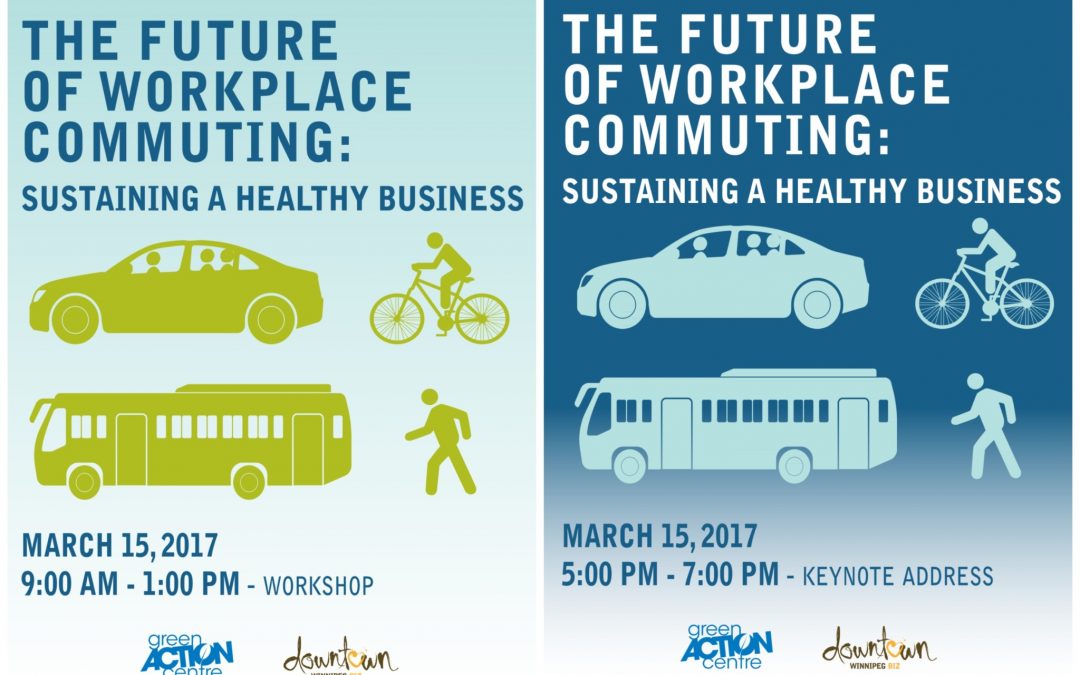“Supporting green and active commuting initiatives delivers benefits to employees, workplaces and the community at large… The most important thing to do is get started.” – Dennis Cunningham, Assiniboine Credit Union
On March 15th, Green Action Centre and the Downtown Winnipeg BIZ partnered to bring Kelly Brough, President and CEO of the Denver Metro Chamber of Commerce, to Winnipeg for The Future of Workplace Commuting: Sustaining a Health Business event. With some last minute changes, we had the pleasure of welcoming Mizraim Cordero, Vice President of Government Affairs for the Denver Metro Chamber of Commerce, in her place.
At the Denver Metro Chamber of Commerce, Mizraim advocates for business-friendly policies on behalf of 3,000 businesses and their 300,000 employees in Colorado. His first role at the Chamber was as the Director of the Colorado Competitive Council (C3), where he worked to keep Colorado’s business climate thriving through education and direct advocacy services at the state, federal and local levels on issues that impact companies of all sizes doing businesses in Colorado. Prior to joining the Chamber and C3, Mizraim served as the Intergovernmental Relations Manager at the City of Commerce City, Colorado. In this role, Mizraim was the city’s chief lobbyist for local, regional, state and federal legislative and advocacy issues. He was also in charge of community relations efforts and stakeholder engagement and supervised the efforts to secure alternative funding sources for city projects through grants.

The morning consisted of a keynote and interactive workshop, followed by an after work panel discussion. During the workshop, two sets of case studies were provided to small groups as a means to create discussion around certain workplace commuting topics. These topics included encouraging a workplace commuting program; dealing with pressure to build a new parkade or provide additional parking space; dealing with workplaces that disallow bikes to enter the building even with lack of quality bike parking outside; making the case moving a workplace to a transit/AT friendly location, such as downtown, as opposed to a cheaper location with lots of parking; gaining the support of businesses for a protected bike lane in a retail focused area; encouraging other modes of transportation to a major destination sites; and persuading City Council and all citizens the benefits of improving transit, pedestrian and cycling infrastructure in specific geographic areas in order to attract start-up businesses to move to Winnipeg. From the discussion, three major themes emerged.
I. Shifting the Driving Culture
The first was that, in order for active and sustainable transportation to truly succeed in Winnipeg, there needs to be a shift in driving culture. Active and sustainable transportation is becoming more normalized and expected by employees and citizens as a whole. Collectively, we must remove peoples’ sense of privilege around driving and parking. At the same time, those who choose to other transportation modes need to be accommodated and celebrated. Employees expect choice from their employers, so if their workplace prioritizes drivers or has an inconvenient location to travel to, this limits employees greatly. Workplaces can accommodate these employees in a number of ways. They can provide sustainable transportation allowances, subsidize an EcoPass, provide quality bike parking options, provide a ridematching service (RideShark), have flexible hours, and allow telecommuting.
II. Economic Benefits
The second theme that arose focused on the significant economic benefits associated with prioritizing active and sustainable transportation. For one, parking can be very expensive for both the employee and employer. The cost of gas, car maintenance, insurance, and parking can be quite high, especially in comparison to taking transit, walking, and cycling. For employers who subsidize parking or are facing pressure to find more available parking options, including building a parkade, this can be very expensive. Instead, employers can provide their employees alternative benefits/subsidies (mentioned previously) that are much more affordable. If an employer already has existing parking spaces or parkade, they can consider renting them and allocating that revenue for the benefits mentioned above. For citizens and the city as a whole, allocating budget towards active transportation and transit infrastructure is very beneficial. For one, high vehicle ridership leads to expensive wear and tear on roads and, on top of that, a high drive-alone ratio creates constant pressure to build new roads. Quality transportation infrastructure can also determine whether or not someone decides to live in a city, as well as attracting new businesses. The City’s ability to attract citizens and businesses impacts the local economy.
III. Workplace Wellness
The third major theme discussed was workplace wellness in relation to transportation. Numerous studies have shown the many health benefits associated with active transportation and public transit (when compared to driving). Winnipeg has a driving culture, where SOVs represent the dominant mode of travel. According to 2011 Census data, 78% of Winnipeggers commute by vehicle. With such high vehicle ridership and traffic congestion, commute times in Winnipeg are now the 6th longest in Canada when compared to 14 other major cities across Canada. Long commutes can lead to health impacts such as high blood pressure, mental health strains, weight gain, etc. A workplace that encourages and accommodates active transportation will have healthier employees that take fewer sick day, are more productive, and feel more positive about their jobs.
“I was pleased to see how many local businesses and institutions are actively working on mode shifts in their workforces, and doing so in creative and effective ways.” – Glen Manning, HTFC Planning & Design

The after work panel included Mizraim Cordero, Dennis Cunningham with Assiniboine Credit Union, Sara MacArthur from Red River College, Elly Bonny from HTFC Planning & Design, and was moderated by John Kiernan with the City of Winnipeg. When it comes to making change, we often become overwhelmed with issues and are not always provided with practical solutions. Hearing from local leaders in workplace commuting left people feeling inspired and wanting to adapt some of the ideas to their workplace.
“I left feeling inspired with all the ideas brought forward. Looking forward to participating in this year’s commuter challenge!” – Gail Wozney, Canadian Museum for Human Rights
Green Action Centre and the Downtown Winnipeg BIZ would like to thank everyone for attending our workshop and panel discussion on The Future of Workplace Commuting: Sustaining a Healthy Business! Special thanks to Leif Norman for taking photos during the event.
For all things related to workplace commuting, visit our Workplace Commuter Options page for resources and services.




Recent Comments